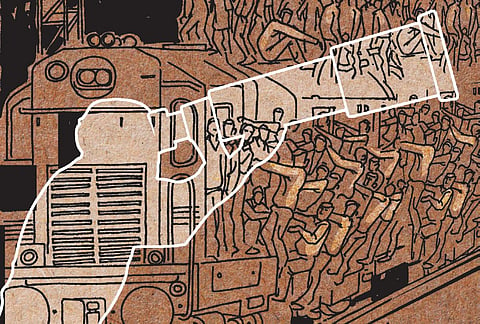India needs to reimagine urban spaces to be a developed nation
The United Nations has said the Indian population, which is already the highest in the world, will continue to rise for another three decades. With an average age of 28.2, the country also has the youngest population in the world. This means a higher need for mobility, as the youth will move to employment centres.
Delhi has a number of satellite cities, which came up in the course of economic growth. Yet, entry to the national capital makes one sad. The ghetto-like habitations dotting the outskirts are without the basic amenities required for a dignified living. They also fail to meet safety parameters: in the event of disasters, man-made or natural, even fire tenders cannot enter the bylanes.
These clusters lack facilities such as parks, open amphitheatres, hospitals, schools, recreation centres, and even open spaces. The psychological cost of living in such areas has not been estimated yet. Sociologically speaking, such habitations also breed violent minds, and crime statistics speak for it.
Directive Principles of the Constitution are often overlooked. But it is there that the founding fathers of Independent India wrote about their dream for a prosperous nation and that the people should be freed from filth and squalor.
This is what policymakers must work for, to make India a developed nation in another two-and-a-half decades. The milestone is aimed to coincide with the nation’s celebrations of 100 years of Independence in 2047. Urban development is a state subject. Within the state, the municipal bodies also have their own domain. Somehow, even the honest intent of policymakers to make the city better is defeated by the existing layers of bureaucracy.
Therefore, it’s most important to put in place an urban redevelopment council with legislative and budgetary support to cut through the layers of governance bodies. It must be mandated to reimagine cities and free them of ghettoes. There should be no habitations where basic norms of dignified living and safety parameters are not there.
Naturally, this will call for the redevelopment of settlements. People loathe such an exercise because it takes several years. The council should demolish this myth. The projects should be delivered in a fixed timeline using modern building tools, which help to erect the structures in record duration.
For India to attain the status of a developed nation, policymakers should think like visionaries. Prime Minister Narendra Modi has taken the lead on the international stage to take visible and verifiable actions to fight climate change. The country is robustly pursuing the energy transition path. Villages in Gujarat are becoming fully solar-powered.
The urban redevelopment council must have in its mandate that all the clusters are solar-powered and do not consume energy from the outside electricity grid. They should rather supply solar-generated electricity to grids to earn extra money, which could be spent on the maintenance of community assets. Water is a precious natural resource.
We must pass this asset to the next generation without depleting it. This can only be done if we harvest rainwater in the new clusters and use it to recharge groundwater. The habitations should have the best facilities for water conservation and efficient use of scarce resources.
Needless to say, city planners must also admit their horizontal bias. When land is scarce and the population is growing, cities will have to go vertical. The Kidwai Nagar Redevelopment Project in Delhi is an example. Vertical clusters can be free of encroachment and made into self-sufficient landscapes with green zones, facilities for elders, nurturing neighbourhoods for children, healthcare centres, community halls, colleges at walking distance, and marketplaces.
No task is big enough for human endeavour. Once legislative and budgetary frameworks are provided for, the nitty-gritty, such as finding temporary stays for the affected people, along with the norms of allotting dwelling units, can be worked out. This will call for a collective effort by the three tiers of democracy to win freedom from filth and squalor.
Sumeet Bhasin
Director, Public Policy Research Centre
Twitter: @sumeetbhasin

